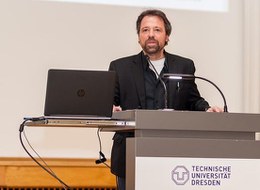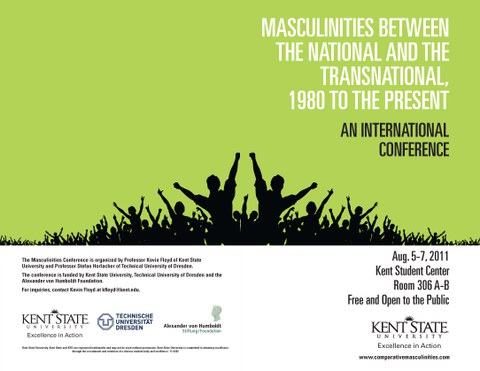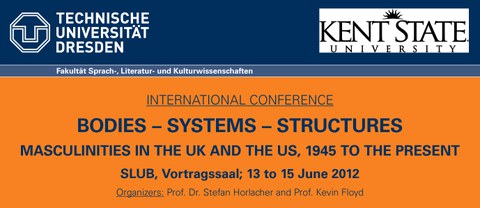Towards Comparative Masculinity Studies
This is a Transatlantic Analysis of the Literary Production of National Masculinities in Great Britain and the United States from World War II to the Present, organised by Prof. Dr. Stefan Horlacher (TU Dresden) and Prof. Kevin Floyd (Kent State University), funded in cooperation with Kent State University (Ohio) and the Alexander von Humboldt Foundation.
Inhaltsverzeichnis
 © Stefan Horlacher
© Stefan Horlacher
Professor
NameProf. Dr. Stefan Horlacher
Eine verschlüsselte E-Mail über das SecureMail-Portal versenden (nur für TUD-externe Personen).
Professur für Englische Literaturwissenschaft
Professur für Englische Literaturwissenschaft
Besuchsadresse:
Wiener Straße 48, 3. Etage, Raum 3.13
01219 Dresden
Sprechzeiten:
Sprechstunden finden donnerstags von 9:30 bis 10:30 Uhr nach vorheriger Anmeldung per E-Mail (stefan.horlacher@tu-dresden.de) statt. Individuelle Sprechstunden können ebenfalls vereinbart werden.
Overwiew
"Towards Comparative Masculinity Studies" undertakes to understand culturally differentiated masculinities not as simply incommensurate with each other, but as operating in relation to each other, to think difference and commonality together and to develop a method that can account for both. The research project thus consists of an in-depth analysis of the literary production of national masculinities in the US and Britain within a rigorously transatlantic framework as well as of the ways in which hegemonic masculinities have to be understood in relation to their varied national and transnational others.
The project compares and contrasts the ways in which in Britain and the United States the cultural and especially literary production of masculinities is mediated by the national, i.e. how masculine identity and national identity mutually inform each other. By understanding the larger context for the emergence of more plural, culturally differentiated and ultimately transnational masculinities and by highlighting the mediating factor of national difference within this broader horizon, the analytical method applied will be able to conceptualize and emphasize difference and commonality simultaneously. This is particularly so when masculinity is viewed as having a largely textual or narrative relational identity and as consisting of a dynamic subject position that has a specific relation to patriarchal power and to the symbolic order.
The project will however not only examine how different forms of national identity in Britain and the US have influenced the construction of masculinity in these countries, but also how alternative constructions of masculinity have influenced the very construction of national identity itself, leading to a re-negotiation of what it means to be British or American. If work on masculinity in literary studies still frequently tends to focus on the literary representation of masculinity, it is absolutely necessary to analyse from a comparative perspective how narrative texts themselves produce certain kinds of nationally-specific masculine identification and how this changes over time. Special attention will be paid to the performative function of literature (cf. Stein 2004) given that the latter opens up a space for the creative construction and critical engagement with a variety of new male subject positions. The representative novels examined can thus be viewed as machines of cultural (re-)production, encompassing a range of critical positions that extend from a crucial literary stocktaking via the emergence of new perspectives to the redefinition of 'Britishness'/'Americanness' and the modification of the image of Britain/America. Moreover, an understanding of the concept of nation as a narrative form which transforms fatality into continuity and contingency into meaning (Anderson 1991) highlights the structural affinities between national and gendered identity on the one hand, and literature and the imagination on the other (cf. Taylor 1994; Freiburg 1998).
As masculinity has also been widely understood in the scholarly literature as a set of cultural and textual practices that normalize the body and psyche as masculine, the aim of this project is to demonstrate how literary texts produce and perform gender identity as much as they produce national identity, the underlying thesis being that the production by literary texts of national and masculine identity together is one of the defining characteristics of the post-war literary landscape in Britain and the US. Therefore the ways in which national masculinity is produced through narrative is examined in at least two different but closely related senses: Firstly, in order to develop, both gendered and national identity assume an imagined, retrospectively posited narrative trajectory: a founding myth (cf. Assmann 1992; Hobsbawm 1990) in the sense of a coherent cultural and/or ethnic past, powerful enough to unify in the present otherwise differentiated, even divergent, social subjects under the umbrella of national identity. Second, both of these forms of identity are themselves the distinctly modern product of the emergence of entirely new narrative forms, the novel form in particular. Thus the production of national identity takes a persistently narrative form, while also being itself the historically specific product of distinct kinds of narrative texts; important examples of such texts would include texts that take unified national or masculine narratives for granted, such as the powerful US narrative of the open frontier, of the so-called settlement of the West. This retrospectively posited story of national unity, which ideologically reunifies divergent and dispersed social subjects within an "imagined community" of national manhood, must constantly be reproduced within entirely new historical and media contexts (cf. Clark 2000). But if narrative texts contribute to the ongoing cultural norm of a coherent, stable sense of national masculinity, it is also the privilege of literature to closely question and deconstruct these very concepts in order to testify to their fluidity and transitoriness.
Between the National and Transnational (2010)
This international workshop took place in Dresden in June, 2010. You can access the conference programme and a short conference report here.
1980 to the Present (2011)
As part of the three-year research project Towards Comparative Masculinity Studies, the second of three international conferences took place at Kent State University in August, 2011.
- conference programme
- conference report (written by Mirjam M. Frotscher and Wieland Schwanebeck, published in Culture, Society and Masculinities)
An essay collection containing a number of papers originally presented at this conference was published by Palgrave Macmillan in 2017.
Bodies - Systems - Structures (2012)
- conference programme
- conference report (H-Soz-und-Kult)


